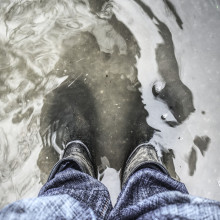When standing barefoot in water, we don't feel the water pressure on our feet. But when wearing Wellington boots, we do feel a pinching - why? We asked Colm-cille Caulfield, Professor at Cambridge University, to help us wade through the science of Daniel's question...
In this episode

00:00 - Why do my Wellies feel heavier in water?
Why do my Wellies feel heavier in water?
Sam Brown asked Professor Colm-cille Caulfield from Cambridge University to wade in with an answer to Daniel's question...
Colm-cille - Think of a hat with a square rigid brim of 10 centimetres by 10 centimetres. When we do the calculations we find roughly a 100 kilograms of atmosphere is pressing down on that hat. It sounds like a lot, but we are used to it and so we don’t typically notice. But what we are actually strongly sensitive to are changes in pressure. Our ears can pop when we go up a hill and we can experience discomfort as a plane lands and pressure equalises...
Sam - To answer our question from Daniel there are three key points we must keep in mind…
Colm-cille - Firstly water is much denser than air, so pressure changes more rapidly with depth. Just 10 metres depth of water exerts a pressure roughly equivalent to the entire atmosphere.
Sam - That explains why submarines need to be sturdily built.
Colm-cille - Secondary, when you wear wellington boots, they hopefully keep you dry and so there is always a layer of air around your legs and feet. Anywhere where there is air in contact with skin, the skin will be feeling atmospheric pressure.
Finally, wellington boots are flexible and so can be affected and bend due to differences of pressure on the inside and outside.
So with bare legs in water, the water pressure is felt uniformly around the skin. The pressure variation is down the leg and is gradual so you don’t notice anything except perhaps where your legs break the surface.
Now consider the way that pressure changes around the boot. Over the depth of the puddle it changes much more rapidly in the water outside, than the air inside. If the puddle is deep enough, eventually, the pressure difference will be big enough to cause the boot to buckle and the rigidity of the boot will shift the forces around, squeezing your legs and toes in certain places. It is this contrast in where the boot touches and where it doesn’t that we notice.
Sam - So there you have it. As for what we can do about it? Maybe try wearing chunky socks next time to keep the wellies from buckling inwards.









Comments
Add a comment